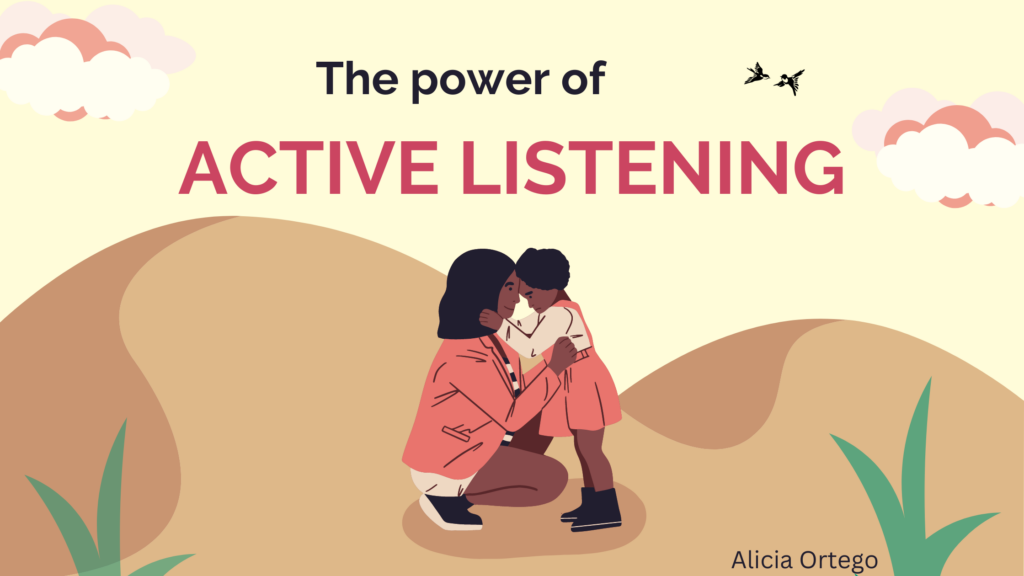The Power of Active Listening: Enhancing Communication with Kids

Communication is a fundamental aspect of our relationships, and when it comes to our interactions with kids, it becomes even more crucial. Active listening is a powerful tool that can significantly improve communication with children. In this blog post, we will delve into the research of renowned psychologists to understand the benefits of active listening and provide practical advice and simple activities that parents can incorporate into their daily routines.
10 Key Factors of Active Listening with Kids:
- Create a Safe and Supportive Environment: Establish an environment where your child feels safe and comfortable expressing themselves. Show support and acceptance for their thoughts and feelings, fostering an atmosphere of trust.
- Give Undivided Attention: Dedicate quality time to listen to your child without distractions. Put away phones or other devices and focus solely on them. This shows that you value their words and are fully present in the conversation.
- Reflective Responses: Reflect back on what your child says to ensure understanding and show that you are actively listening. Paraphrase their words or summarize their message to convey that you comprehend their thoughts and feelings.
- Avoid Interrupting: Resist the urge to interrupt or interject with your own thoughts while your child is speaking. Let them finish their thoughts before responding or asking further questions. This demonstrates respect for their ideas and opinions.
- Use Nonverbal Communication: Nonverbal cues, such as maintaining eye contact, nodding, and using affirmative gestures, demonstrate that you are actively engaged and interested in what your child is saying. These cues encourage them to continue sharing.
- Encourage and Validate Feelings: Let your kids know that it’s okay to feel a certain way and that you understand their perspective. This helps build trust and promotes open communication.
- Ask Open-Ended Questions: Use open-ended questions to encourage your child to elaborate on their thoughts and experiences. These questions prompt them to provide more detailed responses and allow for deeper conversation. Instead of asking, “How was your day?” try asking, “What was the most interesting thing that happened to you today?” Renowned psychologist Dr. Thomas Gordon suggests that parents can ask open-ended questions and encourage children to come up with their own ideas, fostering independence and resilience.
- Provide Positive Feedback: Offer positive feedback to reinforce your child’s communication efforts. Acknowledge their courage in expressing themselves and provide specific praise for their ideas or insights. This boosts their self-esteem and encourages continued communication.
- Practice Active Listening Regularly: Make active listening a consistent part of your interactions with your child. Practice it not only during important conversations but also during everyday moments. The more you practice, the more natural and effective your active listening skills will become.
- Create a story. If your child has hard time sharing, tell him a story about him and let him contribute to this story. This will make him less anxious about sharing him problems and the imaginative situation will help him open up.
The Benefits of Active Listening:
- Building Trust and Connection:
Renowned psychologist Dr. Haim Ginott emphasized the importance of active listening in building trust and connection with children. By truly listening to them, we convey that their thoughts, feelings, and experiences matter. This fosters a sense of trust, strengthens the parent-child bond, and creates a safe space for open and honest communication.
- Validating Feelings and Enhancing Self-Esteem
Active listening involves acknowledging and validating a child’s feelings without judgment. According to psychologist Carl Rogers, this non-judgmental approach helps children develop a positive self-image and boosts their self-esteem. By showing genuine interest and understanding, parents can empower children to express themselves confidently.
- Strengthening Problem-Solving Skills:
Active listening promotes critical thinking and problem-solving skills in children. When parents attentively listen, they encourage children to articulate their thoughts and explore possible solutions.
- Improving Emotional Intelligence:
Psychologist Daniel Goleman’s research on emotional intelligence highlights the role of active listening in enhancing a child’s ability to understand and regulate emotions. When parents actively listen, they demonstrate empathy and teach children to recognize and validate their own emotions. This helps children develop stronger emotional intelligence, leading to healthier relationships and improved communication.
Practical Advice and Everyday Activities
- Reflect and Validate Feelings:
When your child expresses their thoughts or feelings, reflect back on what they said to ensure understanding. For example, say, “It sounds like you’re feeling frustrated because your friend took your toy without asking. Is that right?” Validating their feelings shows empathy and lets them know that their emotions are acknowledged and understood.
- Practice Active Listening Games:
Engage in fun activities that promote active listening. For instance, you can play “Simon Says” to encourage focused listening and following instructions. Another activity is “Guess the Sound,” where you take turns making sounds, and the other person tries to identify them. These games make listening enjoyable and improve communication skills.
- Use Reflective Statements:
When your child shares something, respond with reflective statements to show you understand and empathize. For example, if they say, “I’m really nervous about the school play,” respond with, “It’s completely normal to feel nervous before a big performance. I felt the same way when I was your age.”
Conclusion:
By incorporating these key factors of active listening into your interactions with your children, you can strengthen your bond, enhance their self-esteem, and create an open and supportive communication environment. Active listening with your kids cultivates trust, encourages self-expression, and fosters a deeper connection between you and your child.
More articles

Teaching Kids to Celebrate Differences Through Books
Why Books Matter in Teaching Kids About Differences Teaching kids to celebrate differences through books is one of the most effective and natural ways to build a more inclusive future. Stories have long served as windows into other lives, cultures, and perspectives. When children read books that highlight diversity, inclusion, and empathy, they begin to […]

How Technology Can Empower Your Kids to Learn, Grow, and Thrive
Technology often gets a bad rap when it comes to its effects on children, including issues related to screen time, cyberbullying, and online distractions. While these concerns are valid, these misconceptions should not overshadow its incredible potential to enhance education, creativity and well-being for your child when used responsibly and mindfully. When used appropriately, technology […]

Using Alicia Ortego’s Books in the Classroom: Tips and Examples
In today’s classrooms and after-school programs across America, teachers and educators are constantly looking for effective ways to support children’s social-emotional learning (SEL). Alicia Ortego’s My Superpower books have become a favorite tool for many educators to encourage kindness, mindfulness, confidence, and other important values in young learners. Here are some real-world-inspired ways teachers and […]



